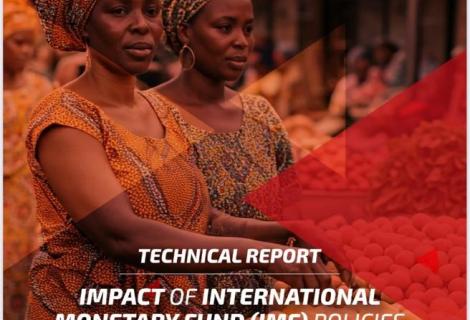Press Release: ActionAid Ghana Launches Gendered Tax Report.

-Calls for enhanced Gender-Responsive Budgeting, Transparency, and Accountability in Tax Reforms to support women in the Informal Sector
Accra, Ghana, November 14, 2024—ActionAid Ghana is advocating for a comprehensive approach to addressing gender-sensitive International Monetary Fund (IMF) recommendations and tax reforms in Ghana. This call forms part of ActionAid Ghana’s advocacy for women’s rights and gender-responsive public service.
In a new report set to be released on November 22, ActionAid Ghana seeks to address a critical gap in the country’s tax policies, which often ignore gender disparities, thereby inadvertently worsening economic inequality. The upcoming report, titled “Impact of IMF Policies on Tax Systems and Gender Equality in Ghana,” highlights how IMF-backed tax reforms, despite being aimed at boosting revenue and ensuring economic stability, engender disproportionately adverse effects on Ghanaian women.
The report provides a detailed analysis, revealing that after Ghana’s engagement with the IMF, mainly through fiscal reform programs, tax policies have emphasised revenue generation. However, ActionAid Ghana’s findings indicate that the IMF’s reliance on indirect taxation, such as Value Added Tax (VAT), has a regressive effect. This type of taxation disproportionately affects women, especially those in lower-income households and informal employment, exposing a significant flaw in IMF's approach to gender considerations.
Key Findings of the Report:
• IMF tax policies in Ghana lean heavily on indirect taxes, such as VAT, which places a higher financial burden on women than men.
• Women, particularly those with lower incomes and fewer assets, face greater economic hardship due to the VAT-heavy system, exacerbating their financial insecurity and hindering economic participation.
• The IMF’s focus on macroeconomic stability has overshadowed equity concerns, often resulting in tax policies that unintentionally worsen gender inequality.
With the successful enactment of the Affirmative Action Law, ActionAid Ghana is calling for concrete measures to promote gender equality in tax systems:
1. Gender-Disaggregated Data Collection:
Implement robust data collection processes to assess the different impacts of tax policies on men and women, enabling targeted policy adjustments.
2. Support for Women in the Informal Sector: To enhance women's economic participation, introduce tax relief measures for low-income earners, particularly in the informal sector, where women are overrepresented.
3. Collaborate with Gender-Focused Organizations: Partner with local and international gender-focused organisations to align IMF policies and Ghana’s gender equity goals.
4. Gender-Responsive Budgeting: Allocate resources specifically to address gender disparities, fostering economic justice and empowering women.
5. Transparency and Accountability in Tax Reforms: Ensure Open
open and transparent discussions on the gendered impacts of tax reforms to align policies with the country’s social equity goals.
As a social justice organisation, we want to emphasis that without gender-sensitive economic policies, IMF-supported tax reforms risk deepening existing social inequalities. As Ghana continues to partner with the IMF on financial strategies, prioritising gender equity is crucial. ActionAid Ghana advocates for a balanced approach that values macroeconomic stability and social fairness, contributing to a more inclusive economy where everyone can prosper, regardless of gender.
-End-